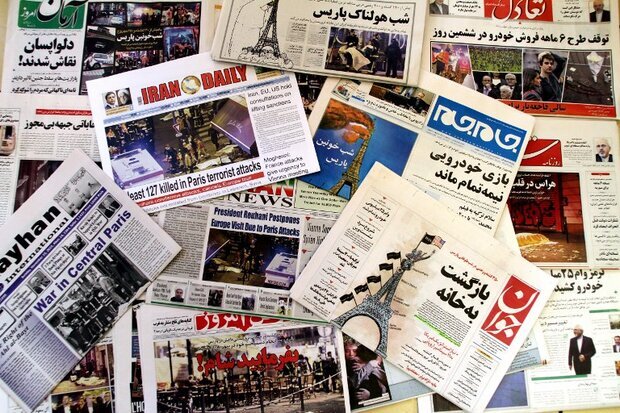The lies of Western supporters become clear

In a note, Kayhan addressed the issue of oil exports and wrote: While Western-oriented media chains in Iran claimed that the increase in Iran's oil exports was due to the reduction of some sanctions by the United States, an American official denied this claim and admitted that increase in Iran's oil exports has happened despite the strict U.S. sanctions.
Following the release of this good news, which happened without the JCPOA and FATF and disregard for the U.S. sanctions, the Western-oriented media chains started to attribute the increase in oil export to a claim of an Iran-U.S. agreement.
They claimed that Iran decreased the level of enrichment and after this action, the United States loosened the sanctions so that Iran could sell more oil, and therefore the new openings happened due to the will of the United States. Now, while a few days have passed since the action of Western circles to distort the "increase in Iran's oil exports" for the benefit of the United States, a spokesperson of the United States Department of State told the Farsi section of the Voice of America that the Biden administration will continue to "strictly" implement the sanctions against the Islamic Republic of Iran, including the sanctions related to oil and petrochemical trade will continue.
Iran: The fruits of the opportunity of the neighborhood
In an analysis, the Iran newspaper discussed the Iran-Iraq railway connection project, saying: This project falls within a policy that the Islamic Republic is pursuing in accordance with its geopolitical position in the region.
Raisi and high-ranking Iraqi officials, in the many conversations they had during the diplomatic meetings, made their minds up to bring the railway connection project into the implementation phase and to use it as one of the important tools in neutralizing and dealing with sanctions. The Shalamcheh-Basrah connection is important because considering that this route is a part of the East-West transit corridor, its completion will increase the passage of goods and passengers from other countries through the Iranian territory, which will result in earning more foreign currency revenues.
In addition to economic benefits and helping to reduce the pressure of Western sanctions on Iran, this railway line will strengthen economic and security cooperation with Syria and Iraq, facilitate "religious and health tourism" among the three countries, and provide access to regional and European markets by Iran. In fact, this project is the starting point for the export of Iranian gas to Europe; this means that parallel to the railway line, the gas transmission pipeline will also be able to be built and operated.
Sobh-e-No: The speed of the West and America is slow
In a conversation with Amir Ali Abolfath, an expert on international issues, Sobh-e-No discussed the process of negotiations between Iran and the United States. This newspaper wrote: Despite all the efforts of the Israelis to prevent any understanding or agreement between Iran and the United States, the agreement will go into effect if it is necessary for the American national interests.
The Western side is willing to reach an agreement with Iran, but the speed by the West and the United States is slow. For example, the Director General of the International Atomic Energy Agency claimed that he reached a "relatively successful" agreement with Iran in March, but it is progressing very slowly. From these words of Grossi, it can be seen that the Americans are willing to return to the JCPOA, but they have conditions and their speed is also slow. Their condition for returning to the JCPOA and the lifting of Iran's nuclear sanctions is that JCPOA Plus and JCPOA 2, 3, and 4 are realized, which are related to Iran's drone, missile, security, and nuclear policies, and Iran does not want to give concessions to the other party in these cases.
Shargh: Increasing Iran's oil exports
Shargh analyzed the increase in Iran's oil exports and sales. It wrote: Reuters claimed in a report that Iran's oil production and exports have increased after an informal agreement between Tehran and Washington because Tehran sells oil to various buyers, including China. Analysts said that this increase in Iran's oil exports is mostly the result of Iran's success in evading U.S. sanctions and Washington's desire to de-escalate tensions with Iran.
According to analysts, Iran has for years evaded oil sanctions through measures such as ship-to-ship transfers and spoofing - or manipulating GPS transponders so that ships show up in different positions - and the country is only getting better at those tactics.
Sara Vakhshouri, president of SVB Energy International, said: "The lack of transparency by the Biden administration over Iran oil policy has consequences for global energy security particularly as some OPEC+ members cut output."
